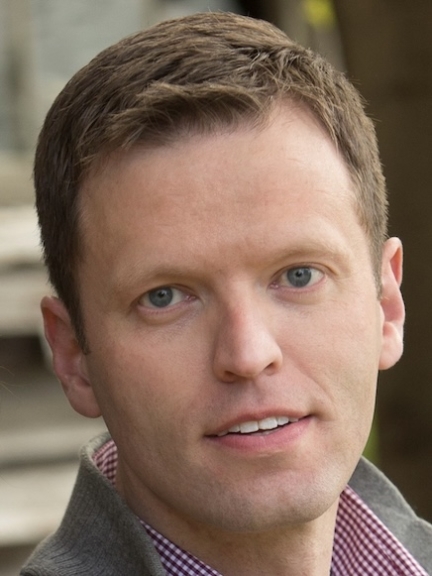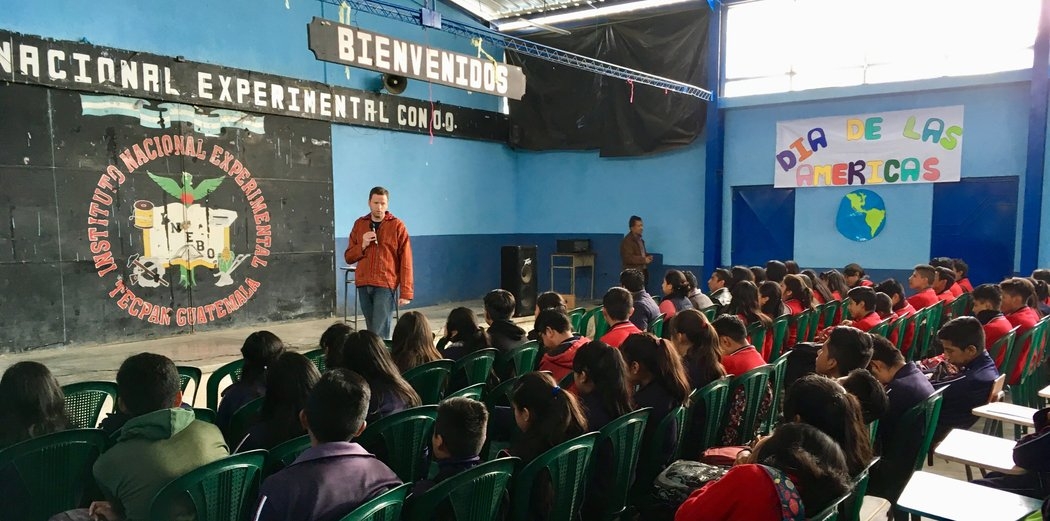Brandon Baird
Professor of Luso-Hispanic Studies & Linguistics

- Office
- Voter Hall 208
- Tel
- (802) 443-5456
- bbaird@middlebury.edu
- Office Hours
- Wednesday 10:00 AM-12:00 PM, Thursday 11:15 AM-12:15 PM, and by appointment
Professor Baird specializes in Hispanic Linguistics and Mayan Linguistics, with emphases in Phonetics & Phonology, Bilingualism & Language Contact, Language Revitalization, and Sociolinguistics. These endeavors have been funded by organizations such as the National Science Foundation, the U.S. Department of Education, and the German Research Foundation.

Community engagement
Campaign by Middlebury College Spanish Majors Aims to Challenge Racial Stereotypes
Courses Taught
IGST 0703
Current
Upcoming
LAS Senior Thesis
Course Description
Latin American Studies Senior Thesis
(Approval Required)
Terms Taught
INDE 0800
Current
Upcoming
Ind Schol Sr Work/Proj/Thesis
Course Description
Terms Taught
LNGT 0226
Phonetics and Phonology
Course Description
The Sounds of Language: Introduction to Phonetics and Phonology
In this course we will study the description and analysis of speech: how the sounds of language are physiologically produced, acoustically represented, and psychologically perceived and categorized. Through acoustic and phonological analysis, students will develop the skills to distinguish and produce the sounds of the world’s languages, as well as explore the sound systems of different languages, in order to determine which patterns differ and which patterns are common to all. Students will hone their analytical and technical skills by solving phonological problem sets as well as by using computer software (Praat) to analyze the acoustics of speech. 3 hrs. lect./disc.
Terms Taught
Requirements
LNGT 0500
Independent Work
Course Description
Independent Work
(Approval Required)
Terms Taught
LNGT 1010
Language Access
Course Description
Language Access
Language access makes the difference between life and death for some of the most vulnerable people navigating and fleeing crises and conflicts worldwide. In this course, students will explore language justice and access within immigration, public health, and educational systems and settings. Students will learn to distinguish the roles of translators and interpreters working in the asylum, detention, and humanitarian parole legal processes. Students will also gain a detailed understanding of the responsibilities and strategies of interpreters and translators in high-stakes and crisis situations by learning from (and supporting) those engaged in language access work, advocacy and research. This course will require engagement with community partners in independent research.
Terms Taught
Requirements
SPAN 0104
Beginning Spanish II
Course Description
Beginning Spanish II
This course is a continuation of SPAN 0101. Intensive reading, writing, and oral activities will advance students’ proficiency in Spanish in an academic setting. (SPAN 0101 or placement exam) 6 hrs. lect./disc.
Terms Taught
SPAN 0220
Current
Intermediate Spanish II
Course Description
Intermediate Spanish II
A course for students seeking to perfect their academic writing skills in Spanish. The course is also an introduction to literary analysis and critical writing and will include reading and oral discussion of literary texts. The course will also include a thorough review of grammar at a fairly advanced level. This course may be used to fulfill the foreign languages distribution requirement. (SPAN 0201, SPAN 0210, or placement) 3 hrs. lect./disc.
Terms Taught
Requirements
SPAN 0250
Current
Spanish for Heritage Speakers
Course Description
Spanish for Heritage Speakers
This course is specifically designed for heritage speakers, i.e., individuals who grew up speaking Spanish at home but were formally educated in another language, or individuals from similar contexts. In this course students will learn about different aspects of their own varieties of Spanish, social perceptions towards them, and how these varieties are valid forms of communication. Additionally, students will study grammatical differences between their varieties of Spanish and a more formal, academic Spanish. The grammatical aspects will primarily focus on written Spanish, vocabulary, and verb tenses that tend to vary in different varieties of Spanish. (by placement exam or waiver) 3 hrs. lct.
Terms Taught
Requirements
SPAN 0322
Hispanic Linguistics
Course Description
Introduction to Hispanic Linguistics
This course is an introduction to the theory and methodology of linguistics as applied to the study of Spanish. The course’s goals are to understand the basic characteristics of human language (and of Spanish in particular), and to learn the techniques used to describe and explain linguistic phenomena. We will study the sound system (phonetics/phonology), the structure of words (morphology), the construction of sentences (syntax), as well as the history and sociolinguistic variation of the Spanish language, as spoken in communities in Europe, Latin America, and Northern America. We will examine texts, speech samples, and songs, illustrating these linguistic phenomena. (SPAN 0220 or placement) 3 hrs. lect./disc.
Terms Taught
Requirements
SPAN 0422
Current
Hispanic Bilingualism
Course Description
Bilingualism in the Spanish-Speaking World
What does it mean to be bilingual? In this course we will study bilingualism with a special emphasis on Spanish-speaking bilinguals in Europe, Latin America, and the United States. Course topics will include social, political, linguistic, and psychological aspects of bilingualism. Special attention will be paid to societal bilingualism, language use among a group or community, individual bilingualism, how an individual’s language use changes in different contexts and throughout an individual’s lifespan, and government and educational policies throughout the Spanish-speaking world. We will study texts, speech samples, and media that highlight different aspects of bilingualism. (At least two Spanish courses at the 0300 level or above, or by waiver) (not open to students who have taken SPAN/LNGT 0377) 3 hrs. lect./disc.
Terms Taught
Requirements
SPAN 0500
Current
Upcoming
Independent Study
Course Description
Independent Study
The department will consider requests by qualified juniors and senior majors to engage in independent work. (Approval only)
Terms Taught
SPAN 0705
Current
Upcoming
Senior Honors Thesis
Course Description
Senior Honors Thesis
The department will award honors, high honors, or highest honors on the basis of a student's work in the department and performance in SPAN 0705. (Approval only)
Terms Taught
Scholarly Work
Selected Publications
Baird, Brandon & Stanislav Mulík. (2024). The Phonetics and Phonology of Indigenous Language Bilinguals. In Mark Amengual (Ed.), The Cambridge Handbook of Bilingual Phonetics and Phonology (pp. 584-606). Cambridge University Press.
Baird, Brandon, Osmer Balam, & M. Carmen Parafita Couto (Eds.). (2023). Linguistic Advances in Central American Spanish. Brill.
Baird, Brandon. (2023). Sociolinguistics in Central America. In Martin J. Ball, Rajend Mesthrie, & Chiara Meluzzi (Eds.), The Routledge Handbook of Sociolinguistics around the World, 2nd edition (pp. 65-73). Routledge.
Baird, Brandon. (2021). Bilingual language dominance and contrastive focus marking: Gradient effects of K’ichee’ syntax on Spanish prosody. International Journal of Bilingualism, 25(3): 500-515.
Baird, Brandon. (2018). Syntactic and Prosodic Contrastive Focus Marking in K’ichee’. International Journal of American Linguistics, 84(3): 295-325.
England, Nora & Brandon Baird. (2017). Phonology and Phonetics. In Judith Aissen, Nora England, & Roberto Zavala (Eds.) The Mayan Languages (pp. 175-200).Routledge.
